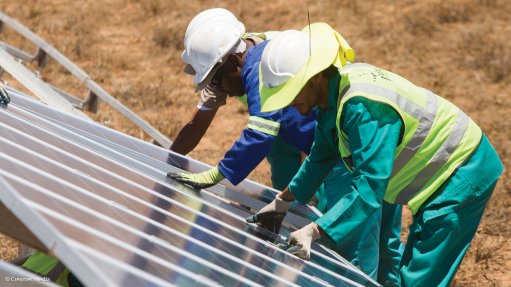South Africa’s IP regime must evolve to adapt to Fourth Industrial Revolution
What the digital (Third) Industrial Revolution achieved on the intellectual property (IP) front in 40 years, the Fourth Industrial Revolution (4IR) has achieved in ten years, Sasol IP counsel principal Jabulani Mthombeni said on Monday, stressing that South Africa has to ensure that it keeps pace with the rate of change.
Amid the fast pace of development, new products are advancing before the regulatory landscape has taken shape.
“We risk becoming irrelevant if we do not respond to the risks and opportunities that are presented with 4IR. As IP practitioners, we have to understand the environment,” Mthombeni said, speaking at the Department of Trade and Industry’s (DTI’s) IP and technology commercialisation colloquium.
As a case in point, he compared the statistics between South Africa and Singapore, as a country that has leveraged 4IR to the benefit of its economic development. While South Africa has an unemployment rate of 27.5%, Singapore has an unemployment rate of 2.1%.
In South Africa, the per capita gross domestic product is $6 160, while in Singapore it is $57 714. Small and medium enterprises make up 99% of business in Singapore, while in South Africa small enterprises barely constitute 40%, with the small enterprises in South Africa employing 20% of the population and Singapore’s small enterprises employing 65% of the population.
Mthombeni said it was fitting that the South African government established the Fourth Industrial Revolution Commission, which serves as the country’s governmental body for adopting new, niche technologies and developing the digital and knowledge-based economy in South Africa.
He added that the commission should focus on improving education and training, through use of smart devices, nanotechnologies and artificial intelligence; promoting health, through telemedicine, robotic healthcare and genomic medicine; ensuring economic security, through deployment of blockchain-based technologies for all transactions and services; and accelerating equitable transition to a low-carbon economy, through the use of smart grids, including energy harvesting and storage systems.
“Current IP systems must evolve in the twenty-first century, as skills and knowledge are keys to the success of our businesses. The IT systems must catch up to these technology advancements,” said companies and Intellectual Property Commission (CIPC) innovation and creativity promotion executive manager Nomonde Maimela, adding that government should move at the speed at which the people it aims to serve are moving.
DTI special economic zones and economic transformation deputy director-general Sipho Zikode said that while the world had entered rapid growth of the application of science to improve human lives, these advancements in science and technology had also created a problem.
“Time and space have been reduced as a result of advancement of technology. What used to take us several days, takes us several hours or even minutes. When it comes to the issues of the global economy, we have seen globalisation, where trade barriers were reduced and the flow of goods became easier between countries.
“But in the past three to four years, we have seen an anti-globalisation movement, redressing all the good things that globalisation has brought in the world. We have seen the rise of tariffs, we have seen the increase in nationalism that is barring trade, causing countries to look inwardly,” he explained.
Zikode added that 4IR offered a great opportunity to use all the technologies that came with it, but noted that some people would use it “to control the world”.
“All the trade wars of today are underpinned by who will control the technologies that come with 4IR, such as big data, robotics, virtual reality and data analytics. Who will control this IP that comes with these developments, because if you control that, you control the world.”
The challenge at the moment is what impact trade wars will have globally. The solution going forward, as a country, Zikode said was to develop its own technology through institutions.
“IP is a tool that the world is using to promote commercialisation of products and services, that seeks to bring the competitive advantage in the market. IP has been recognised as an asset, we will fall behind economically and commercially if it is not developed.
“Our country is positioned to be a major player in the development of materials and products that pave the way for a flourishing manufacturing sector and economy, contributing to the wellbeing of South Africans and the world,” he highlighted.
Comments
Press Office
Announcements
What's On
Subscribe to improve your user experience...
Option 1 (equivalent of R125 a month):
Receive a weekly copy of Creamer Media's Engineering News & Mining Weekly magazine
(print copy for those in South Africa and e-magazine for those outside of South Africa)
Receive daily email newsletters
Access to full search results
Access archive of magazine back copies
Access to Projects in Progress
Access to ONE Research Report of your choice in PDF format
Option 2 (equivalent of R375 a month):
All benefits from Option 1
PLUS
Access to Creamer Media's Research Channel Africa for ALL Research Reports, in PDF format, on various industrial and mining sectors
including Electricity; Water; Energy Transition; Hydrogen; Roads, Rail and Ports; Coal; Gold; Platinum; Battery Metals; etc.
Already a subscriber?
Forgotten your password?
Receive weekly copy of Creamer Media's Engineering News & Mining Weekly magazine (print copy for those in South Africa and e-magazine for those outside of South Africa)
➕
Recieve daily email newsletters
➕
Access to full search results
➕
Access archive of magazine back copies
➕
Access to Projects in Progress
➕
Access to ONE Research Report of your choice in PDF format
RESEARCH CHANNEL AFRICA
R4500 (equivalent of R375 a month)
SUBSCRIBEAll benefits from Option 1
➕
Access to Creamer Media's Research Channel Africa for ALL Research Reports on various industrial and mining sectors, in PDF format, including on:
Electricity
➕
Water
➕
Energy Transition
➕
Hydrogen
➕
Roads, Rail and Ports
➕
Coal
➕
Gold
➕
Platinum
➕
Battery Metals
➕
etc.
Receive all benefits from Option 1 or Option 2 delivered to numerous people at your company
➕
Multiple User names and Passwords for simultaneous log-ins
➕
Intranet integration access to all in your organisation


















